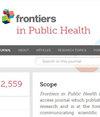Knowledge, attitude, and practices of adolescents and peer educators in relation to the components of the National Adolescent Health Program in India: findings from a cross-sectional survey
IF 3
3区 医学
Q2 PUBLIC, ENVIRONMENTAL & OCCUPATIONAL HEALTH
引用次数: 0
Abstract
BackgroundAdolescence is a critical period of growth and development. Many adverse health outcomes in adulthood begin during adolescence, often due to insufficient knowledge and attitudes resulting from a lack of education. Therefore, appropriate knowledge, attitudes, and practices (KAP) regarding various aspects of health are essential for holistic adolescent and lifelong health. In India, the Rashtriya Kishore Swasthya Karyakram (RKSK or National Adolescent Health Strategy) has utilized an innovative peer-education approach to engage with adolescents and improve their KAPs. Amid limited evidence, we aimed to assess the KAP of adolescents regarding the six themes of the RKSK, with a particular focus on the status of peer educators (PEs). Our objective was to evaluate these aspects disaggregated by sex and to examine how engagement with the RKSK peer-education program influenced their KAP.MethodsA cross-sectional survey of 238 peer educators and 2885 adolescents enrolled under peer educators was conducted in two localities; Madhya Pradesh and Maharashtra states. KAPs were estimated using descriptive statistics then disaggregated by gender. Practice scores of nutrition and non-communicable disease (NCD) were modelled upon engagement with RKSK (graded as 0, 1, 2, 3).ResultsKnowledge was highest regarding substance misuse and lowest in the domains of sexual and reproductive health, and violence and injury. PEs possessed greater knowledge in most domains as compared to adolescents enrolled under them. Attitudes toward abstention from substance misuse were positive, whereas attitudes toward injury and violence, and sexual health, were suboptimal. Boys exhibited better practices related to NCDs, while their nutritional practices were comparatively worse than girls. The RKSK engagement was associated with better nutritional practices: adjusted relative risks (RRs) being 1.04 (95% confidence interval [CI]: 0.94–1.15), 1.12 (1.04–1.21), and 1.21 (1.13–1.31), respectively, for engagement scores 1, 2, and 3 with reference to score 0. The relationship between RKSK engagement and NCD-related practices was restricted to the top engagement group.ConclusionThe knowledge regarding sexual health, and injury and violence, was grossly deficient in adolescents. These components must be prioritized in the program because they are critical for health not only across the life course of individuals but also across generations. However, the RKSK engagement was associated with better practices in a variety of domains, which should be leveraged in the future.印度青少年和同伴教育者对国家青少年健康计划组成部分的认识、态度和做法:横断面调查的结果
背景青春期是成长和发展的关键时期。许多不利于成年后健康的结果都始于青春期,而这往往是由于缺乏教育导致的知识和态度不足造成的。因此,有关健康各方面的适当知识、态度和做法(KAP)对于青少年的整体健康和终身健康至关重要。在印度,Rashtriya Kishore Swasthya Karyakram(RKSK 或国家青少年健康战略)采用了一种创新的同伴教育方法,让青少年参与进来,改善他们的 KAP。在证据有限的情况下,我们旨在评估青少年在 RKSK 六个主题方面的 KAP,尤其关注同伴教育者(PE)的状况。我们的目标是按性别对这些方面进行评估,并研究参与 RKSK 同伴教育项目对他们的 KAP 有何影响。方法在中央邦和马哈拉施特拉邦两个地方对 238 名同伴教育者和 2885 名接受同伴教育的青少年进行了横向调查。通过描述性统计对 KAPs 进行了估计,然后按性别进行了分类。对营养和非传染性疾病(NCD)的实践评分是根据参与 RKSK 的情况进行模拟的(分为 0、1、2、3 级)。结果在药物滥用方面的知识最多,而在性健康和生殖健康以及暴力和伤害方面的知识最少。与接受体育教育的青少年相比,体育教师对大多数领域的知识掌握得更多。对避免滥用药物的态度是积极的,而对伤害和暴力以及性健康的态度则不太理想。男孩在非传染性疾病方面表现出更好的做法,而他们在营养方面的做法则比女孩差。RKSK 参与度与较好的营养实践相关:与 0 分相比,参与度得分 1、2 和 3 的调整后相对风险系数分别为 1.04(95% 置信区间 [CI]:0.94-1.15)、1.12(1.04-1.21)和 1.21(1.13-1.31)。 RKSK 参与度与非传染性疾病相关实践之间的关系仅限于最高参与度组。这些内容必须在计划中优先考虑,因为它们不仅对个人一生的健康至关重要,而且对几代人的健康也至关重要。不过,RKSK 的参与与各领域更好的实践有关,今后应加以利用。
本文章由计算机程序翻译,如有差异,请以英文原文为准。
求助全文
约1分钟内获得全文
求助全文
来源期刊

Frontiers in Public Health
Medicine-Public Health, Environmental and Occupational Health
CiteScore
4.80
自引率
7.70%
发文量
4469
审稿时长
14 weeks
期刊介绍:
Frontiers in Public Health is a multidisciplinary open-access journal which publishes rigorously peer-reviewed research and is at the forefront of disseminating and communicating scientific knowledge and impactful discoveries to researchers, academics, clinicians, policy makers and the public worldwide. The journal aims at overcoming current fragmentation in research and publication, promoting consistency in pursuing relevant scientific themes, and supporting finding dissemination and translation into practice.
Frontiers in Public Health is organized into Specialty Sections that cover different areas of research in the field. Please refer to the author guidelines for details on article types and the submission process.
 求助内容:
求助内容: 应助结果提醒方式:
应助结果提醒方式:


